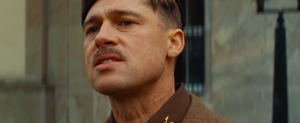Please note: This article from the offset contains spoilers for Inglourious Basterds and other Tarantino movies, including Once Upon a Time… in Hollywood.
This month marks ten years since the release of Inglourious Basterds, the sixth theatrical feature from Quentin Tarantino. The film tells the parallel stories of two fictitious assassination plots against Adolf Hitler: the first a military effort (“Operation Kino”) as Brad Pitt’s Lt. Aldo Raine leads a squadron of Jewish-American soldiers on a Nazi-hunting revenge campaign across occupied France, and the second a personal affair as Jewish refugee Shosanna Dreyfus (Mélanie Laurent) plots to wipe out the entire Third Reich high command as they attend a film premier held at her own cinema. The twist? The plots are successful. They work in tandem without one party ever being aware of the other’s existence. Shosanna and her partner Marcel (Jacky Ido) secure the exits and torch their theatre, while the remaining Basterds gun down Hitler, Joseph Goebbels, and any other high-ranking Nazis who get in the way of their indiscriminate gunfire. In the end, only Aldo, Utivitch (B.J. Novak), and the scheming Standartenführer Hans Landa (a career-defining Christoph Waltz) are left standing. The Nazis are defeated, and World War II ends a year early.
When Inglourious was released, I had just started my final year of high school. As a typical film-obsessed teenager, I was enamoured of Tarantino and couldn’t wait for his latest. If I recall correctly, a few friends (one of them my then-girlfriend, now wife) and I attended a preview screening a few days ahead of its general release – all four of us solidly under 18 at the time. The multiplex where we grew up had a reputation for being notoriously understaffed, and so it was easy for us to buy tickets for a different film and simply sneak into another. We did that for Inglourious and miraculously – despite it being a very busy screening – no-one appeared to claim the seats we had unscrupulously inhabited. Settling into the screening, I distinctly remember hearing the opening beats of Nick Perito’s “The Green Leaves of Summer” (originally from The Alamo) and knowing – just knowing – Tarantino had gotten it right once again. For the entire 153-minute runtime, I was absolutely enthralled. In particular, I remember my pulse furiously racing during the fiery climax, and turning to a friend with wide-mouthed shock and glee as we watched Hitler’s face burst like a balloon under a spray of bullets – something we thought impossible given the historical setting but yet, here it was happening right before our eyes. The screening ended with a resounding round of applause from the audience – a very rare occurrence in the UK, exceedingly so in Scotland. This was something special.

Over the next few weeks, we snuck into screenings of Inglourious a further four times (once including a gang of around a dozen high school pals – how we didn’t get caught, to this day I have no idea). At school, we spoke about practically nothing else. The film even seeped into our studies – while studying “The Crucible” in Higher Drama, we wrote a Tarantino/Arthur Miller mashup entitled “Pulp Witchin’”, recasting many of the play’s figures as iconic Tarantino characters (and yes, it was about as excruciating as you can imagine). But beyond the usual teenage obsession and awe, Inglourious impacted me personally. It appeared during a very formative time when I was beginning to seriously develop my own personal relationship with film, and what the medium means to me. The film astounded me with its broad and unabashed rewriting of historical events, appearing so limitless and unconstrained – after all, why let a silly thing like established history get in the way of a good story?
Inglourious Basterds was the last of Tarantino’s films to be edited by his most important collaborator, the late Sally Menke. This partnership absolutely gives credence to the idea that editors are the ones who make a movie, as Tarantino’s subsequent filmography and partnership with editor Fred Raskin has been a mixed bag. Django Unchained is an underrated delight and the closest thing to an honest-to-God bona-fide spaghetti western in decades, but it doesn’t quite reach the delirious highs of Inglourious. Tarantino’s two most recent efforts – The Hateful Eight and especially Once Upon a Time… in Hollwood – sadly border on the tedious, and Raskin unfortunately emerges as an editor who lacks the courage to push back against Tarantino when most necessary. When we recently saw Once Upon a Time…, my wife remarked that, like Wes Anderson, Tarantino has in recent years become a genre of his own, with Once Upon a Time… simultaneously representing the peak and nadir of that genre. In short, Tarantino’s recent movies are too much of a good thing, and lack the finesse and sure-handedness that guides the Basterds so gloriously in their journey through Nazi-occupied France. Indeed, Tarantino attempts historical revisionism again with Once Upon a Time…, but, in this writer’s opinion, to a much less successful – and tasteful – degree. World War II is a broad canvas in which it is easy to insert fiction. The Manson Murders are not.
Inglourious Basterds is a film that never humanises or sympathises with its Nazis, and it isn’t interested in granting its fascists nuance or growth, compassion or empathy, or anything else in-between. This is especially true of its two most prominent Nazis, the first of which is Waltz’s Landa, who insists he is not a Nazi, despite wearing a Reich uniform and acting under its command. Utilising his past life as a detective – a “damn good one” – he creates a comfortable life for himself working with the Nazis, hunting down desperate Jewish refugees and those who shelter them. He casually shrugs off his barbaric nickname – The Jew Hunter – as “just a name that stuck”. When he captures Aldo and negotiates a deal to switch sides to the Allies, it is solely on the promise of personal accolade and commercial gain: history will record him as the sole mastermind behind Operation Kino and the destruction of Germany’s high command. Landa is successful in negotiating his deal and is allowed passage to Allied territory under the guise of surrendering to Aldo, but the good Lt. – acting as an audience surrogate – informs the despicable Quisling that he will not allow Landa’s shedding of his Nazi uniform, literally and figuratively, and proceeds to carve a Swastika into his forehead with his blood-stained Bowie knife. The film tells us that personal ideology and internal motivations mean nothing, and actions mean everything: if you work for the Nazis and wear a Nazi uniform, you are a Nazi regardless of what you consider yourself. And that we can’t abide.

The same is true for “war hero”-turned movie star Fredrick Zoller (Daniel Brühl) – a young Nazi Private experiencing newfound celebrity for single-handedly slaughtering 250 Allied troops. His “heroism” is now the basis for Joseph Goebbels’ latest propaganda extravaganza Nation’s Pride, with Zoller starring as himself. Although appearing benign, Zoller aggressively pursues Shosanna Dreyfus and attempts to court her with his charm and newfound fame. Adopting a humble, friendly demeanour to try and win Shosanna, his façade eventually drops when his advances are continually and profusely rebuffed. Cornering Shosanna in her projection booth during the Nation’s Pride premier, he angrily rants about everything he’s done for her and how much she owes him. Only when Shosanna appears to relent to him – appearing to give him what he’s wanted the entire movie – does he too relent. It’s then that Shosanna does what she’s wanted to do the entire movie, and puts a bullet in him. In one final act of entitled, fascistic aggression, the mortally wounded Zoller blasts Shosanna away, too. Zoller claims to be uncomfortable watching the scenes of aggression in Nation’s Pride and displays embarrassment as he’s recognised in cafes and restaurants, but his charm and humility is nothing but a poorly-applied disguise that Shosanna sees straight through. A Nazi can dress and act however they please, but underneath it all they’re still a Nazi.
Therein lies the moral centre of Inglourious Basterds: anyone who identifies as a Nazi, or willingly collaborates with Nazis, has shed their humanity and with it their right to mercy. Fascism is not merely a difference in politics or opinion: it is a difference in morality. That’s something even a 16 year old high school student sneaking into the film five times understood. As a teenager ten years ago, I experienced a giddy amount of depraved glee watching Aldo and his Basterds tear through Nazi-occupied France, and Shosanna barbequing the high command while declaring herself the Face of Jewish Vengeance, showing exactly the amount of mercy the Nazis deserved. As an adult, that glee has not diluted and I doubt it ever will, for the film’s grand finale still emits a feeling of, “this is how it should have been”. Few films have truly thrilled me in the same way Inglourious Basterds does – it’s my favourite of Tarantino’s films, and I absolutely consider it his best – but it also teaches us a very necessary lesson in tolerance and acceptance, or lack thereof when appropriate. In the immortal words of Lt. Aldo Raine:
“Nazi ain’t got no humanity. They’re the foot soldiers of a Jew-hatin’, mass-murderin’ maniac – and they need to be destroyed.”

